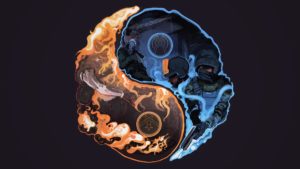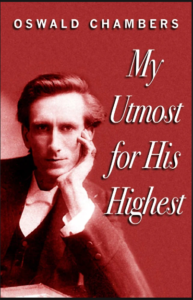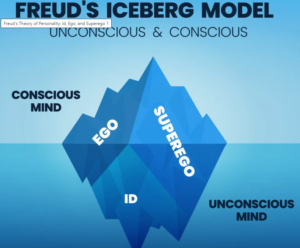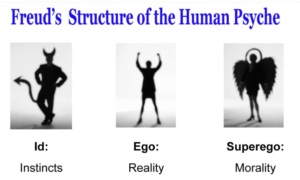超越, Chāoyuè = Transcendence, Chinese
超越, Chāoyuè = Transcendence, Chinese
Part 1 What my peers are saying, Ying and Yang revisited.
Part 2 Freud, Jung and Lieberman
Part 3 DMN revisited & Transcendence.
Part 4 Epilogue…Oswald Chambers
Part 1 What my peers are saying, Ying and Yang revisited.
In many of the cohorts blogposts (all written very well) I sensed the age old battle/philosophy between the Ying and Yang, the conscious and unconscious portions of our psyche wrestling for control.
the Ying and Yang, the conscious and unconscious portions of our psyche wrestling for control.
One class member wrote, “Again, I wonder if religion is a way for us to not completely deny our dark side but also to not completely give into it? Is this how we become our true self?”
A perpetual swirl of light fighting dark? This striving for balance appears to be where many of my peers have settled on in their blogposts describing Lieberman’s Spellbound: Modern Science, Ancient Magic, and the Hidden Potential of the Unconscious Mind [1]. I suppose harnessing the dark side to empower the good?
I feel am on shaky ground when I consider balancing my dark and light. However, in order to understand Lieberman I headed back to Freud and Jung.
Part 2 – Freud, Jung, Lieberman
For want of word space I resort to pictures. Does anyone remember this?
Examples Of The Id, Ego, And Superego – Skipping a workout:
The id: I want to skip my workout because I feel lazy and just want to relax.
The superego: I shouldn’t skip the workout because it’s essential for my health and discipline.
The ego: I can do a shorter workout today and make up for it with a longer session tomorrow.
The proverbial image of the Angel on one shoulder with the Devil on the other comes to mind. For further development and more pictures, See – Freud’s Theory Of Personality: Id, Ego, And Superego, By Saul Mcleod, PhD, Updated on November 9, 2023, Reviewed byOlivia Guy-Evans, MSc, www.simplypsychology.org/psyche.html
Moving on to Jung…
I lack the depth to compare Freud and Jung (who influences Lieberman) but Dr. Jeri Jacobson does a great job at Freud vs Jung – Similarities and Differences Last reviewed by Dr. Sheri Jacobson March 4, 2023 https://www.harleytherapy.co.uk/counselling/freud-vs-jung-similarities-differences.htm
Some excerpts.
“Jung had an inexhaustible knowledge of mythology, religion and philosophy, and was particularly knowledgeable in the symbolism connected to traditions such as Alchemy, Kabala, Buddhism and Hinduism. Utilising this vast knowledge, Jung believed that humans experienced the unconscious through numerous symbols encountered in various aspects of life such as dreams, art, and religion.”
We can see the impact this on Lieberman in his chapter headings, The Magical Instinct, Part II Magic, Fairy tails, Alchemy, Mystical Numbers, the Tarot. Clearly a disciple of Jung. In his Introduction, The Unconscious and supernatural, Lieberman writes, “When it comes to how you think and feel your way through life, at best you are the copilot. At worst, you’re along for the ride, at the mercy of your brain…It’s called the Unconscious.” [2] Sadly, the chapter titles lend itself to thinking about the presence of the Dark side of the Force in our lives.
I noticed red flags popped up in the cohort. It did for me too. Colorado Springs is known for its many Christian/Faith Based NGOs. Across the valley, however, is Manitou the hub for our witch and marijuana clusters. I can’t seem to get away from witches. In the spirit of equality, the population of witches in the U.S. Army demands a “chaplain” to minister to them. I believe she resides on a base in Arizona. At first glance Lieberman reminds me of the Joker’s (from a Batman movie) question “Have you ever danced with devil in the bright moonlight?” My first impressions of the book made me wonder if we were dancing with the Devil.
Like any onion, however, one needs to peel back the layers of the onion to find what lies beneath (thanks Shrek).
Part 3 DMN revisited & Transcendence.
Something familiar appears when Lieberman speaks to the Default Mode Network. He writes, “when the mind wanders, the default mode network is activated”,(p.213). I hearken back to Meyer, Jan, and Ray Land. 2006. Overcoming Barriers to Student Understanding: Threshold Concepts and Troublesome Knowledge. A threshold concept can be considered as akin to a portal, opening up a new and previously inaccessible way of thinking about something” (p.4).
This opening portal brought me back to the AHA moment. Ina Catrinescu (Moldovan)– speaks to the Aha Moments: See Aha! Moments: The art & science of breakthroughs | Ina Catrinescu | TEDxTirguMures https://www.youtube.com/watch?v=FDNy9HFEcaM. At the 9:10 minute mark, Catrinescu describes the DO Nothing experience where the unconscious mind continues to work the problem.
Kally Elliot writes that her mom would say “Now, go to bed and let your brain work on it while you’re asleep.” Elliot continues, in his book, Spell Bound, Daniel Lieberman reveals how to partner your ego or conscious mind with your unconscious to better make decisions, learn tasks, or, in my case, write sermons. He writes, “The ego and the unconscious are good at different types of mental processing, and humans function most effectively when there is an optimal division of labor.”[3]
I do remember (was it last year?) when the Default Mode Network appeared on our reading charts. Previously, I have said that the time ironing clothes were “hours of my life lost.” With Overcoming Barriers to Student Understanding: Threshold Concepts and Troublesome Knowledge and now Lieberman I have been reinforced in perceiving the mundane tasks of “house husbandry” into moments patiently waiting for the AHA moments.
Lieberman ends up on Transcendence in his final chapter. Perhaps this is the most important take away from the book. In his introduction he writes, “The final section of the book will detail this process further and examine how it leads to transcendence, a state of balance and contentment arising from the ability to go beyond a focus on one’s personal needs and attain a more cosmic perspective.”[4]
In part III, Lieberman writes, “The ultimate goal of the mystical journey is transcendence, a word that means “to go beyond.” In the mystical tradition, transcendence refers to rising above the apparent duality of opposites.”[5] He refers back to Jung, “In Jungian psychology, transcendence is seen in the unity of opposites contained within the archetypes, the joining of darkness of light and the spiritual with the chthonic.”[6] (Chthon·ic adjective – concerning, belonging to, or inhabiting the underworld: “a chthonic deity”
Sigh.
Perhaps Lieberman redeems himself in my eyes when he goes on to, “Self-transcendent people look outward, away from themselves, prioritizing friends and family, humanity, other species, and the universe as a whole.”[7]
Lieberman’s comment reminds me of a previous blogpost I did for Polanyi[8] , “Enter the Generation Y (30 somethings) and Z (20’s). These generations consume global information at a “staggering” pace. The consumer power they wield is tremendous and through the power of social media than can expose “industry dirty laundry” to millions of other consumers globally. These and future generations are intensely aware of climate change, work force conditions and other socially conscious issues which impact their purchasing choices – one power. The power of “cancellation” is the other power.
Travis Vaughn puts transcendence into perspective for me when he writes, “As Christians, we have an ALLY similar (and dissimilar) to how Lieberman refers to the unconscious. Where Paul says he does the things he doesn’t want to do, WHO does he turn to? “Who will deliver me from this body of death? Thanks be to God through Jesus Christ.” Our ALLY is the transcendent God. Travis ends… “Having the righteousness of Christ imputed to us, we walk with God’s Spirit to produce the fruit (see Galatians 5:22) we can’t in our own power. God is our ally – God is helping us! This is how we connect with transcendence.”
Thanks Travis.
Part 4 Epilogue: Oswald Chambers… Same word different meaning….
In his November 15 Daily Devotional [9] , Oswald Chambers wrote, “Most of us live only within the level of consciousness— consciously serving and consciously devoted to God. This shows immaturity and the fact that we’re not yet living the real Christian life. Maturity is produced in the life of a child of God on the unconscious level, until we become so totally surrendered to God that we are not even aware of being used by Him. When we are consciously aware of being used as broken bread and poured-out wine, we have yet another level to reach— a level where all awareness of ourselves and of what God is doing through us is completely eliminated. A saint is never consciously a saint— a saint is consciously dependent on God.
[1] Daniel Z. Lieberman, Spellbound: Modern Science, Ancient Magic, and the Hidden Potential of the Unconscious Mind, Dallas: BenBella Books, 2022, Kindle version, 26 of 308.
[2] Ibid, p. 1
[3] Ibid, p.62
[4] Ibid, p. 8
[5] Ibid, p. 211
[6] Ibid, p. 212
[7] Ibid, p. 212
[8] Karl Polanyi, The Great Transformation the Political and Economic Origins of Our Time, 2nd Beacon Paperback ed. (Boston, MA: Beacon Press, 2001).
[9] Chambers, Oswald. My Utmost for His Highest. Updated edition. Grand Rapids, Michigan: Discovery House, 1963. See 15 November.
7 responses to “超越, Chāoyuè = Transcendence, Chinese”
Leave a Reply
You must be logged in to post a comment.




Russell, you did a great job incorporating so many perspectives that connected to Lieberman’s book. Like you, I found parts of Lieberman’s thinking that rang true. You use Oswald Chambers’ quote to put a beautiful spin on conscious/unconscious integration and what it can mean for our spiritual lives. Also like you, I felt ill at ease with some of Lieberman’s ideas, especially as you referenced when he started interacting with Carl Jung’s work. I guess this week I’m reminded of Jules Glanzer’s wisdom to do the necessary work of “triaging the voices” we hear.
Hi Kim,
Thanks for commenting. Of course, Dr. Clark selected this book to ruffle our feathers. What is nice about it is that Freud and Jung are foreign to me. I had to educate myself on the impact that they might be having not only on Lieberman but society as a whole.
Once I got a bead on Jung, I could see how influenced Lieberman and in time read “Lieberman’s “Self-transcendent people look outward, away from themselves, prioritizing friends and family, humanity, other species, and the universe as a whole.”
He moves us away from a self-centered perspective to one that looks outward (maybe) serving our society and being good stewards of the world.
Not bad.
Shalom…
Kudos to you, Russell, for bringing in so many points of view. You also, graciously, express concern and yet remain open to what might be gained. This reading has me thinking much about Miller. Miller mentions that idea that the consumer desire is implicated in an “economy of lack”(p. 111). However, he contrasts this with the Christian desire as being one that is not birthed out of lack but responding to a call from beyond oneself. I am pondering the fact that we are wired to look outside of ourselves to resolve the mystery within us. So it makes sense that without the grounding of God himself, all sorts of immitative methods take the place to make sense of the mystery within us and of God himself. Personally, I too, was unnerved by the reading, but did gain much insight regarding the research Lieberman has done on the unsconscious mind. We are truly fearfully and wonderfully made.
I really appreciated the journey you took us on Russ. I could tell you were struggling with the book but not ignoring how wrestling with it might shape you (while not uncritically accepting everything).
Hi Tim,
Thanks for commenting.
When I first accepted Christ (age 33) I was constantly reading the bible, even when I was OIC (Officer in Charge) of the night TOC (Tactical Operations Center) shift.
I was reading my bible when one of my Captains exclaimed out loud, “Your a witch?” Yes replied the Sergeant who was working with him. “So is my husband” she added.
Later she accused me of sexual harassment. I was stunned. My boss was a seasoned Christian. He said, “Welcome to the Spiritual Battle!”
Sigh. I seem to be a magnet for “other worldly” folk. Reading Lieberman brought these memories back (one of several). I guess this should not be a surprise to those in “God’s Army.”
Know the Enemy (thanks Sun Tzu).
Shalom…
Hi Esther,
Thanks for commenting. I have found that the best instructors in this class (right behind Clark) are my peers. I ALWAYS like reading the cohorts perspective before my fingers hit the keyboard.
You mentioned, “So it makes sense that without the grounding of God himself, all sorts of imitative methods take the place to make sense of the mystery within us and of God himself.”
Yup…
Blaise Pascal. wrote, “There is a God–shaped vacuum in the heart of each man, which cannot be satisfied by any created thing but only by God the Creator, made known through Jesus Christ.”
Wow…go Pascal.
Before Pascal…Solomon. Ecclesiastes 3:11
He has made everything beautiful in its time.
HE HAS ALSO SET ETERNITY IN THE HUMAN HEART ; yet no one can fathom what God has done from beginning to end.
I have equated this eternity to the void Pascal speaks to. This void in all men, all cultures, seeks to be filled. The Hawaiians did it with their pantheon of Gods. Asian cultures have a wide smorgasbord (funny word) of belief systems seeking to explain the eternal.
The book, as I am sure Dr. Clark intended, was to forced us out of our safe space to see what the “sheep” are doing.
Sadly, sheep (us included) have never been the brightest of animals.
Shalom…
Russell,
Thank you for such a well written post. I appreciate how you took us on a journey as you clearly worked through some of your difficulty with the idea of combining the unconscious and conscious mind. I also appreciate how you incorporated so many different readings in your post.